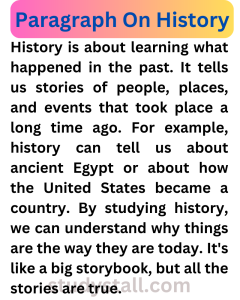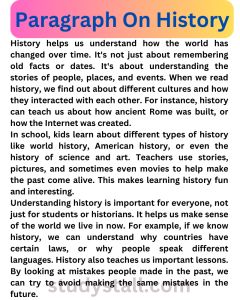History is the record of past events, experiences, and knowledge that shape our present and future. It is a fascinating subject that allows us to understand the development and progress of human civilization over thousands of years. From ancient civilizations to modern times, history provides valuable insights into the triumphs and challenges faced by our ancestors.
Paragraph On History 100 words
History is about learning what happened in the past. It tells us stories of people, places, and events that took place a long time ago. For example, history can tell us about ancient Egypt or about how the United States became a country. By studying history, we can understand why things are the way they are today. It’s like a big storybook, but all the stories are true.
Paragraph On History 200 words
History is the study of the past. It’s not just about dates and old battles; it’s also about understanding people and how they lived. For example, we can learn about the lives of kings and queens, but also about regular people like farmers and soldiers. History is everywhere, in books, museums, and even the old buildings around us.
By studying history, we learn how things have changed over time. We can see how people thought in the past and what was important to them. For example, in history, we learn why some countries are rich and others are poor, or why some laws exist. Understanding history can help us make better choices for the future.
Paragraph On History 300 words
History helps us understand how the world has changed over time. It’s not just about remembering old facts or dates. It’s about understanding the stories of people, places, and events. When we read history, we find out about different cultures and how they interacted with each other. For instance, history can teach us about how ancient Rome was built, or how the Internet was created.
In school, kids learn about different types of history like world history, American history, or even the history of science and art. Teachers use stories, pictures, and sometimes even movies to help make the past come alive. This makes learning history fun and interesting.
Understanding history is important for everyone, not just for students or historians. It helps us make sense of the world we live in now. For example, if we know history, we can understand why countries have certain laws, or why people speak different languages. History also teaches us important lessons. By looking at mistakes people made in the past, we can try to avoid making the same mistakes in the future.
Paragraph On History 500 words
Importance of Studying History
Studying history is crucial as it enables us to learn from past mistakes, understand cultural differences, and appreciate the achievements and contributions of previous generations. Here are some reasons why studying history is essential:
- Learning from the Past: History helps us avoid repeating past mistakes. By examining the causes and consequences of historical events, we can analyze the decisions made by individuals and societies, both successful and disastrous. This knowledge allows us to make informed decisions in the present and shape a better future.
- Understanding Cultural Diversity: History provides us with an opportunity to explore different cultures and societies. It helps us comprehend the values, beliefs, and customs of people from various regions and time periods. Understanding cultural diversity fosters tolerance, acceptance, and empathy towards others, enhancing social harmony.
- Preserving Identity: History plays a vital role in preserving our identity and heritage. By exploring our historical roots, we can develop a sense of belonging and pride in our cultural, ethnic, and national backgrounds. It allows us to connect with our ancestors, their struggles, and their achievements, creating a strong foundation for our present and future.
- Developing Critical Thinking: Studying history encourages critical thinking skills. It teaches us to analyze and evaluate different sources of information, separating facts from biases and propaganda. By examining primary and secondary sources, we can develop a well-rounded perspective on historical events, enhancing our ability to think critically and make informed judgments.
- Shaping a Global Perspective: History provides us with a global perspective on human development and progress. By studying the history of different regions and civilizations, we gain insights into the interconnectedness of societies and the impact of their interactions. It broadens our understanding of global issues, fostering a sense of global citizenship.
Different Approaches to Studying History
Historians use various approaches and methodologies to study history. These approaches help in analyzing and interpreting historical events and understanding their significance. Here are some common approaches to studying history:
- Political History: This approach focuses on political institutions, leaders, and power struggles throughout history. It examines the impact of political decisions and policies on societies and individuals.
- Social History: Social history emphasizes the study of social structures, customs, and everyday life of different groups in society. It explores the experiences and perspectives of ordinary people, providing a broader understanding of historical events.
- Cultural History: Cultural history examines the beliefs, values, art, literature, and intellectual developments of a particular time period. It provides insights into the cultural norms, artistic expressions, and intellectual movements that shaped societies.
- Economic History: This approach analyzes the economic systems, trade, and technological advancements throughout history. It explores the impact of economic factors on societies, including changes in living standards, production methods, and patterns of wealth distribution.
The Role of Historians
Historians play a crucial role in studying and interpreting history. Through extensive research, analysis, and interpretation of primary and secondary sources, historians provide valuable insights into the past. They contribute to our understanding of historical events, challenge existing narratives, and shed light on overlooked perspectives.
Historians also help preserve historical artifacts and documents, ensuring their accessibility to future generations. They collaborate with archaeologists, archivists, and curators to uncover hidden treasures and preserve the material culture of the past.
Moreover, historians play a significant role in shaping public memory and collective consciousness. Their work influences how historical events are remembered, commemorated, and taught in schools and universities. By presenting well-researched and balanced narratives, historians contribute to a more accurate and inclusive understanding of the past.
Conclusion
In conclusion, history is a vital subject that allows us to understand the past, learn from it, and shape a better future. By studying history, we gain insights into the decisions, achievements, and struggles of our ancestors, helping us make informed choices in the present.
History provides us with a global perspective, fostering cultural understanding, and promoting tolerance. It encourages critical thinking skills and helps preserve our identity and heritage. Historians play a crucial role in researching, interpreting, and preserving historical knowledge, ensuring its relevance for future generations.
So, let us embrace the study of history and explore the rich tapestry of human experiences that have shaped our world. Through history, we can gain wisdom, empathy, and a deeper appreciation for the complexities of our shared human journey.
FAQ
1. Why is studying history important?
Studying history is important because it allows us to learn from past mistakes, understand cultural differences, and appreciate the achievements and contributions of previous generations.
2. How does studying history help us avoid repeating past mistakes?
By examining the causes and consequences of historical events, studying history enables us to analyze the decisions made by individuals and societies, both successful and disastrous. This knowledge allows us to make informed decisions in the present and shape a better future.
3. What role does history play in preserving our identity?
History plays a vital role in preserving our identity and heritage. By exploring our historical roots, we can develop a sense of belonging and pride in our cultural, ethnic, and national backgrounds. It allows us to connect with our ancestors, their struggles, and their achievements, creating a strong foundation for our present and future.
4. How does studying history encourage critical thinking skills?
Studying history encourages critical thinking skills by teaching us to analyze and evaluate different sources of information, separating facts from biases and propaganda. By examining primary and secondary sources, we can develop a well-rounded perspective on historical events, enhancing our ability to think critically and make informed judgments.




